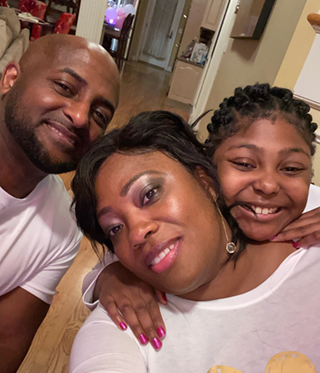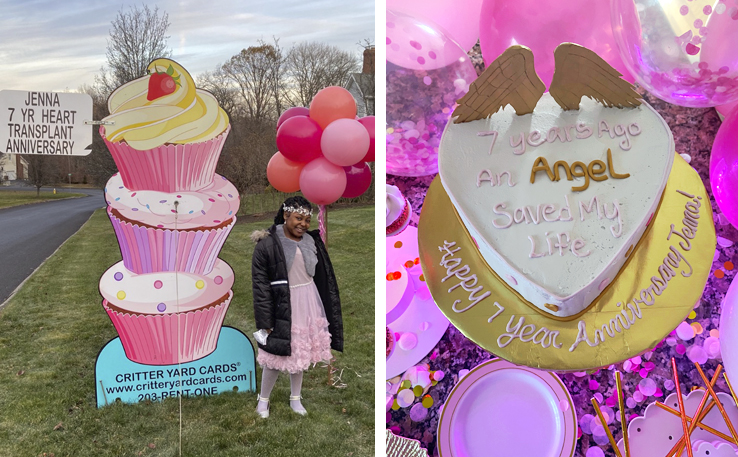Amazing Things: Jenna Skeete
The inspiring survival story of an infant born with half a heart, and how her family honors her donor every year.
“What is this? It doesn’t look like a heart!”
That’s what Tina Skeete remembers saying when Dr. Allison Levey, a pediatric cardiologist at NewYork-Presbyterian Morgan Stanley Children’s Hospital, drew a picture of her baby’s heart during Tina’s 20-week ultrasound in December 2009.
A couple of days before, Tina had seen her OB-GYN for a routine checkup. Now, she found herself in Dr. Levey’s office, staring at a sketch showing a misshapen heart missing two chambers on the left side, a severe congenital malformation called hypoplastic left heart syndrome that affects two to three of 10,000 pregnancies.
While taking in the news, Tina, now 43, and her husband, Darren, 47, were given options no prospective parents want to hear: end the pregnancy; do nothing and give birth, which would lead to the infant’s rapid death; or opt for a three-stage surgery, the first procedure occurring when the newborn was just a few days old.
Dr. Levey, also an assistant professor of pediatric cardiology at Columbia University Irving Medical Center, told the Shelton, Connecticut, couple they could go to Morgan Stanley Children’s Hospital to follow up or get a second opinion at a medical center closer to home. They did get a second opinion, in Connecticut, and got the same shocking information. Tina decided to have her baby there, for convenience’s sake, then spent the remaining three months at home, waiting and praying.
On April 30, 2010, their daughter Jenna was born with a barely functioning heart and was promptly intubated and put on life support. Doctors there told the couple that there was nothing they could do because her heart was damaged beyond repair and that surgery wouldn’t be successful.
Facing the Odds — and Misconceptions
Tina was distraught, but she remembered Dr. Levey’s urging her to reach out should she need anything. Jenna’s doctors got in touch with doctors at Morgan Stanley Children’s Hospital as well as two other medical centers. Only the team at Morgan Stanley Children’s Hospital said it would take Jenna. The Skeetes went there immediately, following an ambulance that transported Jenna, fragile and intubated, to New York City late at night.
“The next morning, who came walking into the hospital room but Dr. Levey — the doctor I’d met three months earlier,” recalls Tina. “We immediately felt a huge sense of relief.”
The Skeetes also met Dr. Emile Bacha, chief of the Division of Cardiac, Thoracic and Vascular Surgery at NewYork-Presbyterian/Columbia University Irving Medical Center, who gave the couple a rundown of Jenna’s three surgeries to come. It would be a hard road, but Dr. Bacha sounded confident.
“He told us, ‘I am going to do everything in my power for Jenna,’” Tina recalls. He also explained that there had been many advances in these kinds of delicate surgeries.
“If they are done correctly, with the right specialists and at the right hospital, these kids can have a good future,” Dr. Bacha says.
That didn’t mean the three surgeries would be easy. Jenna was born missing her left ventricle, the major pumping chamber of the heart.
“Basically, the surgeries reroute the blood inside the heart so that the right ventricle does all the pumping,” explains Dr. Bacha. “It can’t be done in one step; the heart and lungs have to adapt to the new situation.”
At 6 days old, Jenna, made it through her first open-heart surgery.
Her second wasn’t as smooth.
On day three post-op, the 6-month-old suffered a stroke, sending the Skeetes into a state of uncertainty.
Once Jenna was stable, doctors advised them to closely watch the development of Jenna’s motor skills over the next year. But the Skeetes didn’t have long to wait: At 8 months, Jenna began to crawl, then soon after started picking up Cheerios — signs that her motor skills were developing.
A Long Road
At 3, Jenna, a spunky preschooler, underwent her third open-heart surgery. Drs. Levey and Bacha were optimistic but cautioned the Skeetes that if complications occurred, Jenna might need a heart transplant. Instead of dwelling on the negative, Tina focused on what seemed to be Jenna’s amazing recovery, describing her as running around like “an Energizer Bunny.”
Until one day, six months after her third operation, Jenna fell to the ground, crying that her leg hurt. She was unable to stand. The Skeetes rushed her to their local hospital, where they learned Jenna had septic hip arthritis, an inflammation of the joint due to infection. Surgery was required to drain the infected area.
Two days later, during what was supposed to be a routine MRI of her hip, Tina grew alarmed when, instead of taking the expected 45 minutes, the procedure stretched to two hours, then three.
“I was walking around like a mad person,” she says, “until someone finally came out and told us that Jenna had gone into cardiac arrest during the scan.”
When the Skeetes were able to see Jenna in intensive care, their daughter looked nothing like the lively little girl they knew.
“She was intubated and swollen,” says Tina, “and so sick that we couldn’t move her to NewYork-Presbyterian Morgan Stanley Children’s Hospital. It was so painful to see our daughter like that.”
For seven days, Jenna was on life support. Phone calls flew back and forth to her doctors at NewYork-Presbyterian, who were alarmed.
Other hospitals weren’t even willing to try to fix Jenna. The team at NewYork-Presbyterian Morgan Stanley Children’s Hospital never gave up on her.
Tina Skeete
“They told us we had to extubate her, that there was too much pressure on her heart,” Tina recalls. Finally, Tina and Darren demanded that the breathing tubes be taken out. Within 10 minutes, Jenna was awake and talking.
She finished her recovery back at Morgan Stanley Children’s Hospital. Six weeks later, at home again, Jenna collapsed, complaining of pain in her other leg. Another MRI brought terrible news: Jenna had another joint infection, a complication from her heart failing.
“There are a few complications we dread, and this was one of them,” says Dr. Bacha.
It was time for a heart transplant, the last-resort option, the one Tina had blocked out of her mind.
“Our world came crumbling down,” recalls Tina.
Jenna was listed as 1A, which is top priority for a heart transplant. Tina and Darren waited and kept watch over Jenna in the hospital while family and friends helped out with the Skeetes’ son and daughter, Malike and Kiara, at home.
Finally, after three weeks of watching their daughter on life support, the Skeetes got some welcome news: A heart was available, and it was a perfect match.
“When I heard, I jumped up, started crying and hugged the doctor so hard I practically knocked her over,” Tina recalls.
From there, things moved quickly, with a surgical team from NewYork-Presbyterian flying to retrieve the new heart.
“Knowing Jenna since before she was born, I knew she was a fighter,” Dr. Levey says. “And while this next step was a big one, I knew she would do well.”
A Triumph of Teamwork
Dr. Bacha says Jenna’s surgery December 15, 2014, was “extremely challenging,” but when he emerged from the operating room eight hours later, he had good news for the 60 or so friends and family who had gathered in the waiting room. Jenna was doing well.
“There were two surgeons, two anesthesiologists, two perfusionists [who monitor heart and lung function] and three or four nurses in that operating room. It was a triumph of our team’s work,” says Dr. Bacha. Within 45 minutes, the Skeetes could see and touch their little girl in the ICU. Five months later, after learning to walk again, Jenna left the hospital April 1, 2015, “on her own two feet,” says Tina.
In the five years since, Jenna has not been admitted to the hospital. She has regular follow-up visits twice a year and takes medication to suppress her immune system and prevent organ rejection, but in all other ways, life for the Skeetes is approaching normal.
“The doctors at NewYork-Presbyterian never made me feel that they were giving up on Jenna — they kept saying, ‘Jenna is a fighter,’” she says. “She’s going to do just fine.’”

Paying Tribute to Her Donor
Jenna, now 11, hasn’t forgotten about her new heart — or the child who gave it to her.
“Once in a while, she’ll ask, ‘Is my little person watching over me now, Mommy?’” says Tina. “That’s what she calls the donor — her little person.”
Every year on the anniversary of Jenna’s transplant, the Skeetes throw a celebration and release balloons into the air in honor of her donor. This year was no different.
“As a family, we woke up at 6 a.m. and cried happy tears, thanking God she is still here with us,” says Tina. “I prayed for Jenna’s donor family and thank them every single day for this beautiful, precious little girl.”
Jenna’s school made an announcement over the loudspeaker about her anniversary, and her friends and teachers made her beautiful cards to celebrate her. At home that evening, Jenna, her two sisters, and her parents commemorated the seventh anniversary of her heart transplant.
Even though friends couldn’t come because of COVID precautions, their at-home celebration was still as festive as ever. The family sported “Team Jenna” T-shirts, and Jenna wore her own custom T-shirt that read, “You’re looking at an awesome heart transplant survivor.” They ordered from their favorite Japanese restaurant, played board games, listened to music, and enjoyed a delicious vanilla cake that read “7 Years Ago an Angel Saved My Life.” And of course, Jenna and her family kept up the tradition of releasing red balloons, a tribute to Jenna’s donor.

Celebrating the seventh anniversary of Jenna’s heart transplant.
There are still challenges — Jenna must take extra care at school and at home to avoid germs because of her suppressed immune system — “but we are grateful every day,” says Tina.
Jenna is now a fifth-grader who loves to read and dance. According to Tina, she is spunky, kind, compassionate, strong, and fierce.
“Other hospitals weren’t even willing to try to fix Jenna,” says Tina. “The doctors and transplant team at NewYork-Presbyterian Morgan Stanley Children’s Hospital never gave up on her.”

